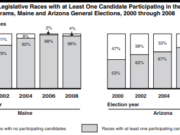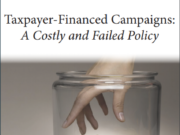We often point out that while supporters of tax-financed campaigns portray these programs as a way to fundamentally transform the make-up and behavior of government, existing tax-financing programs are plagued with corruption, and they look (see here and here) and act (see here and here) a lot like the privately-financed legislatures they replaced.
Interestingly, the tax-financing program most frequently touted as a model for states to adopt is also the one that is plagued by the most severe corruption problems: New York City’s. The Brennan Center calls New York City’s program a “success,” the Campaign Finance Institute calls it “a model for the nation and states,” and even the New York Times Editorial Board recently characterized it as a program that “has worked remarkably well” and should guide New York state as it seeks to reform its campaign finance laws. Contrasting from all this praise is our study (linked above, but also here if you missed it) of corruption in New York City’s tax-financing program, which found that between 2001 and 2013 over $19 million in tax dollars was given to City Council candidates who were later investigated (and often convicted) of violating the law.
We can add another name to that list now as New York City has charged $18,000 in penalties to James Wu, a 2009 candidate for New York City Council in the Democratic Primary who flagrantly violated campaign finance laws. Wu was fined for 10 different violations, such as accepting a contribution from a corporation (which is illegal in New York City Council campaigns), accepting three contributions that exceeded the legal limit, and “intentionally furnishing false documentation and information.”
These are not minor errors, mistakes, or the result of confusing regulations. The limit on contribution sizes and the ban on corporate contributions are clear. Wu intentionally violated the law in accepting those contributions, and then also willfully falsified loan records to skirt expenditure limits. Wu’s conduct is clearly illegal, but as our report has documented, it is not unusual in New York City’s public financing program.
Proponents of tax-financed campaigns point out that providing tax dollars to candidates creates an incentive for people to run for office, implying that this incentive will produce better candidates or “real challengers” (as the New York Times put it) to the presumably corrupt establishment. But while it’s true that tax-financing programs incentivize campaigning by increasing the money available for campaigns, there’s no reason to assume that the new challengers are automatically less corrupt than privately-financed candidates. As Wu and the many other cases we’ve documented over the years show, tax-financed campaigns do not cleanse the political process of corrupt players. On the contrary, they create new avenues for corruption and manipulation of the political process for private profit.
Groups and individuals that are concerned about the influence of money in politics should remember that power corrupts, whether it’s achieved with a tax-financed campaign or a privately financed one. The problem of corruption in government is age-old, but optimism that a government-administered grant program for political campaigns can solve the issue is the foolish logic of people who must have been born yesterday. Tax-financed campaigns are a ‘been there, done that’ idea that haven’t achieved their goals. Sadly, the myth that tax-financing improves politics persists, and as a result citizens of Arizona, Connecticut, Maine, and New York City are stuck footing the bill for corrupt politicians like James Wu.














